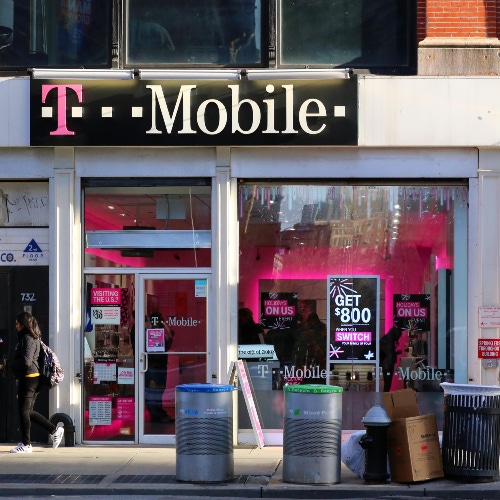
T-Mobile appears to have purchased $21.1 million worth of midband 2.5GHz spectrum from Shentel, which T-Mobile will likely use to reinforce its 5G network.
Shentel disclosed the spectrum sale in its most recent SEC filing, but it did not name the company that purchased the spectrum. However, during Shentel's recent quarterly earnings call, company officials suggested T-Mobile purchased the spectrum in order to "augment their current capacity."
Brian Goemmer, founder of spectrum-tracking company AllNet Insights & Analytics, suggested that T-Mobile is the likely buyer of Shentel's spectrum, though he said the companies haven't yet notified the FCC of their potential spectrum exchange. Officials from Shentel and T-Mobile did not respond to questions from Light Reading about the sale.
Figure 1:  (Source: Robert K. Chin - Storefronts/Alamy Stock Photo)
(Source: Robert K. Chin - Storefronts/Alamy Stock Photo)
Shentel's sale of its 2.5GHz spectrum doesn't come as a surprise. The company last year signaled that it would discontinue its fixed wireless Internet business, dubbed Beam Internet, that worked over its 2.5GHz spectrum holdings. Shentel had initially hoped to expand its Beam-branded fixed wireless service to 215,000 locations by 2026 – across parts of Virginia, West Virginia, Maryland and Pennsylvania – but it quickly dumped those plans to focus on cable and fiber connections. Now, the company is selling the spectrum that underpinned that fixed wireless access (FWA) strategy.
Shentel's fixed wireless exit builds on the company's withdrawal from the mobile industry following the $1.9 billion sale of its mobile network and customers to T-Mobile, a deal the company finalized last year.
As part of its quarterly earnings report, Shentel disclosed more details about its fiber and cable network buildout. The company said it plans to upgrade a portion of its existing DOCSIS cable network to the new, faster DOCSIS 4.0 standard over the next few years. The company said that its DOCSIS 4.0 upgrade would likely cost $250 to $350 per passing across around 165,000 total locations. Shentel's fiber buildout plan extends to almost 500,000 locations by 2027 and the company said it expects to spend up to $1,400 per passing for that effort.
T-Mobile's midband options
For T-Mobile, its apparent purchase of Shentel's spectrum simply adds to its massive 2.5GHz war chest. The company acquired an enormous amount of midband spectrum in 2020 via its purchase of Sprint, and since then it has been buying additional 2.5GHz spectrum licenses around the country.
Most recently, T-Mobile spent $304 million in an FCC spectrum auction, winning roughly 90% of all the licenses sold in the auction.
However, Goemmer, of AllNet Insights & Analytics, suggested the prices that T-Mobile paid in that FCC auction are not necessarily reflective of the true value of 2.5GHz spectrum licenses in general. "It is clear that the licenses in Auction 108 are not homogeneous and have unique license challenges that must be investigated individually. These challenges drive wide swinging valuations. In addition, the FCC's minimum bids skewed both the bidding activity (purchasing licenses with no population or overpricing licenses with limited population) and the valuation process," he wrote on his website.
Indeed, Shentel's CFO suggested that "the value of our [2.5GHz] spectrum had grown slightly," which prompted the company's recent sale.
So where might T-Mobile turn next for additional 2.5GHz licenses? The financial analysts at LightShed Partners noted that Nextwave holds substantial 2.5GHz holdings. However, Nextwave's new plan to build a private wireless network across some major US cities might complicate T-Mobile's efforts to purchase that spectrum.
"There are also other smaller lots of 2.5 GHz spectrum in the market that T-Mobile could mop up, at the right price," the analysts wrote in September.
Related posts:
— Mike Dano, Editorial Director, 5G & Mobile Strategies, Light Reading | @mikeddano
About the Author(s)
You May Also Like











